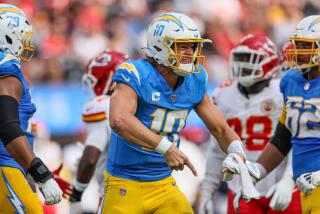CHARGER REVIEW : NOTEBOOK : Team’s 1992 Schedule Looks Like NFL Light
- Share via
Order your season tickets now. The Chargers’ home schedule next season is set and it looks as appetizing as a . . . cupcake.
In addition to games against AFC West opponents, the Chargers will play host to Indianapolis (1-15), Tampa Bay (3-13), Cincinnati (3-13) and Pittsburgh (7-10). The road schedule is a little tougher, but not much.
The Chargers will play Indianapolis, Phoenix (4-12), Houston (11-5) and Cleveland (6-10). The combined record of teams on the Chargers’ out-of-conference schedule is a woeful 32-78.
Whoever coaches the Chargers in 1992 has got to like the prospects for next season.
The Chargers’ draft position is not quite as promising. They traded away their No. 1 pick to Washington for rookie guard Eric Moten, who they selected in the second round of the 1991 draft. If they had not traded for Moten, the Chargers will pick fifth, sixth or seventh.
However, they did acquire Houston’s No. 1 pick in a trade for defensive end Lee Williams. But since Houston finished with an 11-5 record, the Chargers can pick no better than 20th. If Houston should happen to advance to the Super Bowl, the Chargers would pick 27th or 28th.
Shawn Jefferson, a key ingredient of the Williams trade, still has not shown the Chargers he can be effective in the NFL.
Jefferson, the Oilers’ ninth-round pick out of Central Florida, was supposed to give the Chargers another deep threat to go with Anthony Miller, but he spent most of the season learning plays.
Jefferson was given a chance to start Sunday, but he did not make a great impression.
On the Chargers’ first play from scrimmage, Jefferson dropped a seven-yard out from John Friesz.
He played the rest of the quarter, but he was not seen again until late in the fourth quarter.
Jefferson finished the season with 12 catches for 125 yards. He scored a touchdown in the Chargers first game of the season, but he was not spotted near the end zone again.
Eric Bieniemy, the Chargers’ second-round pick, had a fitting end to his rookie season. He left the game with a partially separated shoulder, which he hurt in the first quarter trying to tackle Denver punter Mike Horan on a fake punt.
Bieniemy, who played almost exclusively on special teams, finished the season with 17 yards in three carries.
Chargers cornerback Gill Byrd ended his first Pro Bowl season a quarter early when he left the game with a bruised heel.
“I can barely walk,” Byrd said. Will the injury cause Byrd to miss the Feb. 2 Pro Bowl in Honolulu? Not a chance.
“I’ll get there somehow,” Byrd said. “I wouldn’t miss this game for anything.”
Is John Elway the Broncos’ quarterback or Steve Sewell? Sewell, a running back, threw two passes, one on a halfback option and another out of the shotgun formation.
Both passes were incomplete.
The Chargers also came equipped with a gadget play, and it almost worked. Ronnie Harmon handed off to Darren Carrington on a kickoff reverse in the fourth quarter. Carrington took the ball at the 13 and appeared to have clear sailing down the left sideline, but Martin Bayless could not quite get an angle to block Denver’s Randy Robbins.
Carrington was brought down by Robbins at the Charger 35.
Carrington, picked up as a Plan B free agent from Detroit, continues to impress. He intercepted his third pass in four weeks in the first quarter. He almost had another one, but he dropped Elway’s Hail Mary pass in the end zone on the last play of the first half.
Chargers linebacker Leslie O’Neal made a late pitch for the Pro Bowl with 5 1/2 sacks in his last two games to finish with a team-high 10.5 sacks.
Sorry Leslie, but Pro Bowl votes had to be in before the last two games.
“Maybe I was the best defensive end not to get to the Pro Bowl,” O’Neal said.
In just his third season, Marion Butts is already the Chargers’ fourth-leading rusher of all-time. Butts carried seven times for 46 yards and now has 2,742 yards, which moves him past Keith Lincoln.
It took Lincoln seven seasons to get 2,698 yards.


